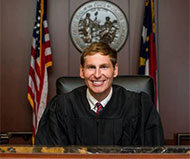Article from: www.thenewspaper.com/news/71/7124.asp
3/16/2022
Appellate Court Pulls The Plug On North Carolina Red Light Cameras
North Carolina Court of Appeals for a second time rules red light camera program unconstitutional.
 By Richard Diamond
By Richard Diamond
Red light cameras have once again been found unconstitutional in North Carolina following a decision Tuesday by the state Court of Appeals. A three-judge panel unanimously struck down a "funding scheme" the General Assembly and city of Greenville had used a to bypass the state constitutional requirement that money from fines be used for the benefit of local schools. Instead, a third of the cash has been diverted for the use of out-of-state vendors.
Since 2016, Greenville has operated under a local law that granted American Traffic Solutions (ATS, now Verra Mobility) the power to issue automated citations on the city's behalf. The company operated all aspects of the photo ticketing program, and in return it kept $31.85 out of every $100 the company successfully collected. The court took care to note that the system was set up by an ATS engineer, Robert F. Rennebaum, who, according to the state engineering board, had been "aiding and abetting [ATS] to evade or attempt to evade the provisions of [North Carolina law]." Rennebaum was banned from practicing engineering in the state and fined $5000 in 2019.
Article IX, section 7 of the state constitution requires "the clear proceeds of all penalties and forfeitures and of all fines collected" to go to the public school system. The state Supreme Court interprets 'clear proceeds' to mean at least 90 percent of the profit. Instead, ATS/Verra Mobility generated $2,495,380 in profit between 2017 and 2019, of which $706,986 weent to Greenville and ATS/Verra Mobility. That means only 71 percent of the clear proceeds went to the schools. Greenville argued what it was doing was legal because, under the arrangement, 100 percent of the money went to the school system first, and after that the school system would cut a check to the city.
"This argument asks us to not only frustrate the clear intent of the people in ratifying Article IX, Section 7, it also contravenes the plain language of the Fines and Forfeitures Clause, which provides that 'the clear proceeds... shall belong to and remain in the several counties, and shall be faithfully appropriated and used exclusively for maintaining free and public schools.' ...The clear purpose of the people in mandating that the clear proceeds of such fines be 'faithfully appropriated' to the public schools cannot be circumvented by the elaborate diversion of funds or cleverly drafted contracts," Judge Jefferson Griffin wrote for the three-judge panel.
The court cited the work of Brian Ceccarelli, who unlike Rennebaum, has been a licensed professional engineer with an unblemished record in the state. Ceccarelli observed the red light camera violation at issue in the case was issued a fraction of a second after the light turned red, but the court declined to intervene on those grounds, saying that it is the job of the legislature to decide whether enforcing barely perceptible violations is appropriate.
"Developments in technology will continue to present challenging problems with which policymakers must contend," Judge Griffin wrote. "This court, however, does not sit to make policy determinations. A citizen's best defense to what he sees as incompetent or corrupt policy judgments is to appeal to his fellow citizens and hold his government to account at the ballot box."
The state Court of Appeals struck down red light cameras on the same grounds fifteen years ago in a decision upheld by the Supreme Court (read final opinion). When cities learned they would no longer be able to keep the profits from the program, they quickly dropped the cameras. Cary, Charlotte, Fayetteville, Greenville, Greensboro, High Point and Rocky Mount all shut down in the wake of the ruling. The legislature in 2016 began approving local laws with the "funding scheme" to bypass the 2007 court decision.
A copy of Tuesday's ruling is available in a 200k PDF file at the source link below.
Source: Fearrington v. Greenville (Court of Appeals, State of North Carolina, 3/15/2022)
Permanent Link for this item
Return to Front Page
 By Richard Diamond
By Richard Diamond